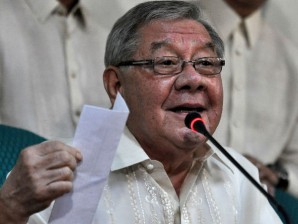Bishops, lawmakers meet on RH bill

Speaker Feliciano Belmonte confirmed that he and other lawmakers met with some bishops in September. INQUIRER FILE PHOTO
Lawmakers are optimistic that Congress will finally end the gridlock on the divisive reproductive health (RH) bill after some leaders of the Catholic Church have given their inputs to the substitute measure introduced by Albay Rep. Edcel Lagman.
A member of the House majority, who declined to be named because he was not authorized by the House to speak on the matter, said at least four bishops—Antonio Ledesma, Gabriel Reyes, Deogracias Iñiguez and Teodoro Bacani—who have been vocal in opposing the bill had given their inputs to the substitute measure.
The source said this explained why the substitute bill had been “toned down” from the original bill, which the Church had vigorously opposed for its provisions on mandatory population control measures. “With their endorsement, we expect the RH bill to be passed soon,” the source said.
Pangasinan Rep. Kimi Cojuangco said some bishops had met with some lawmakers to discuss the substitute RH bill. “This is true. They met with Speaker (Feliciano) Belmonte. RH bill proponents have already bent over backward to accommodate the antis and yet to no avail. The substitute bill is a good bill,” she said.
In a text message, Belmonte confirmed that he and other lawmakers met with some bishops in September. Belmonte, however, did not identify the bishops and did not say if the Catholic leaders would support the substitute bill as a compromise.
Cojuangco said that this week’s voting would be critical. “We will know more this week. If they (bishops) are supporting it (the substitute bill), of course, I am contented. In the language that bishops understand, ‘whatever you do for the least of my brothers that you do unto me.’ We all know who said those words and is what the RH bill is all about,” she said.
Fr. Melvin Castro, executive secretary of the Church hierarchy’s Episcopal Commission on Family and Life, meanwhile, said Bishop Reyes, chairman of the commission, was not part of those who had written the substitute bill.
Castro said he mentioned to Reyes reports that identified the bishop as among those who had a hand in drawing up the substitute bill.
The bishop denied any involvement, Castro told the Philippine Daily Inquirer in a text message.